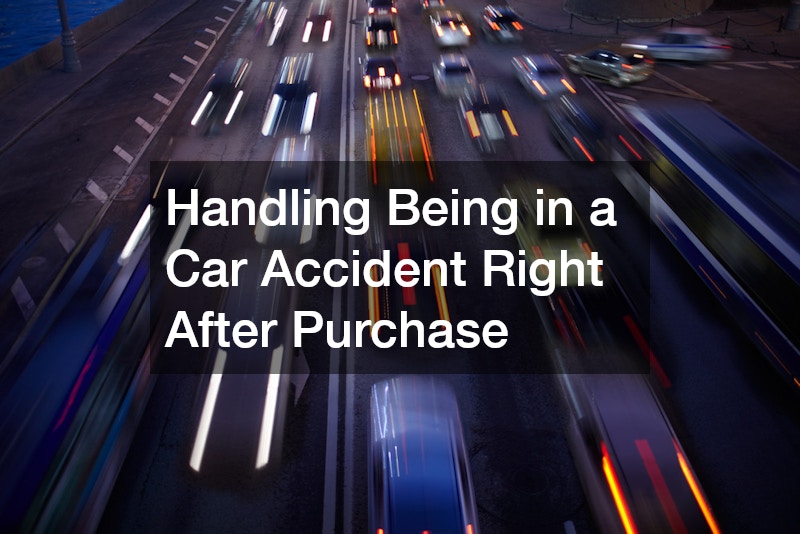Experiencing a car accident immediately after purchasing a vehicle can be both emotionally distressing and financially daunting. Whether it’s a brand-new or pre-owned car, getting into a crash so soon after taking ownership is a situation few drivers anticipate. In addition to managing the shock and logistical complications, you’ll need to navigate your auto insurance company’s policies, dealership protocols, and potential legal issues. This guide provides a comprehensive breakdown of how to handle such an event with clarity and confidence.
What Are My Initial Steps After a Car Accident Right After Purchase?
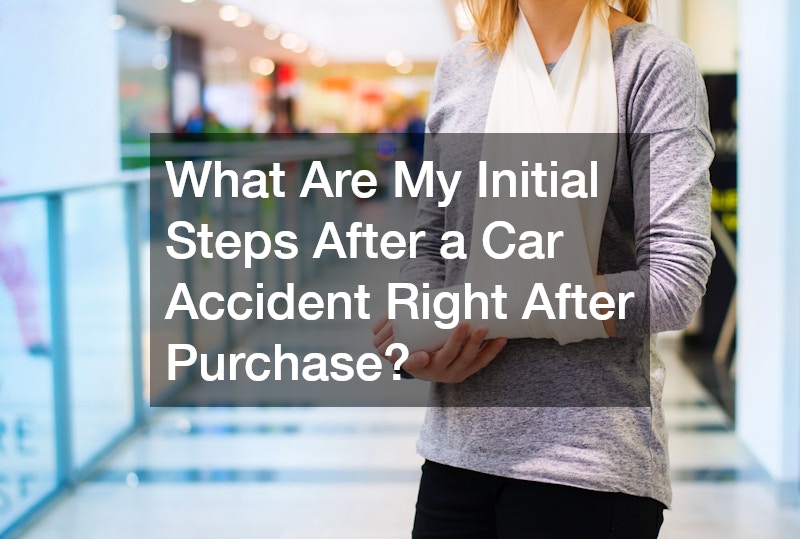
Assess the Safety of the Scene
The very first priority after an accident is to ensure everyone’s safety. Check yourself and passengers for injuries, then assess the condition of others involved. If the vehicle is in a dangerous position, such as the middle of a busy road, and it’s safe to move it, do so to prevent further hazards. Turn on hazard lights and set up warning triangles if available.
Contact Emergency Services
Regardless of the accident’s severity, it’s crucial to contact emergency services. Police documentation will be important for your insurance claim and legal protection. If there are any injuries, requesting medical assistance promptly is essential. Police presence also ensures that all parties involved provide accurate information for the report.
Collect Necessary Information
Exchange personal and insurance details with the other driver(s), including names, addresses, driver’s license numbers, and insurance policies. Gather the vehicle identification numbers (VINs), license plate numbers, and contact details for any witnesses. These details will be vital for claims and liability assessments.
Document the Accident
Use your smartphone or a camera to photograph vehicle damage, road conditions, signage, and injuries if present. Make a note of the time, date, weather conditions, and any relevant road features. These images and notes will support your case if there are disputes or complications during the claims process.
Notify Your Insurance Company
As soon as possible, notify your auto insurance company about the incident. Many insurers have mobile apps or 24/7 hotlines for quick reporting. Prompt notification ensures that the claims process can begin quickly and your policy coverage is active.
How Does My Insurance Work for a New Vehicle Accident?
Understanding New Car Replacement Policies
Some insurance providers offer new car replacement coverage, especially for vehicles under a year old or with low mileage. This policy ensures you receive a new version of the same make and model if your car is totaled. If this coverage was selected during policy setup, it could significantly reduce the financial impact of a severe accident.
Comprehensive vs. Collision Coverage
Comprehensive insurance handles damage not caused by collisions, such as weather-related events or vandalism. Collision insurance, however, covers damages from accidents with other vehicles or objects. For a new car, both types of coverage are highly recommended to avoid substantial out-of-pocket expenses.
Utilizing Gap Insurance
If your car is financed or leased, gap insurance covers the difference between the amount you owe and the car’s depreciated value. This can be crucial if your new vehicle is totaled shortly after purchase, as vehicles depreciate the moment they leave the dealership.
Reporting the Incident to Insurers
When contacting your insurer, be ready to provide a detailed account of the accident, photographs, and the police report. Ask about the documentation process and whether they will send an adjuster or require repair shop estimates.
Claim Processing Timeframes
The duration of claim processing varies based on complexity, damage extent, and cooperation from involved parties. Many insurers complete assessments within a few days, but repairs, inspections, and settlements may take longer. Stay in regular contact with your adjuster to monitor progress.
Should I Contact the Dealership After the Accident?
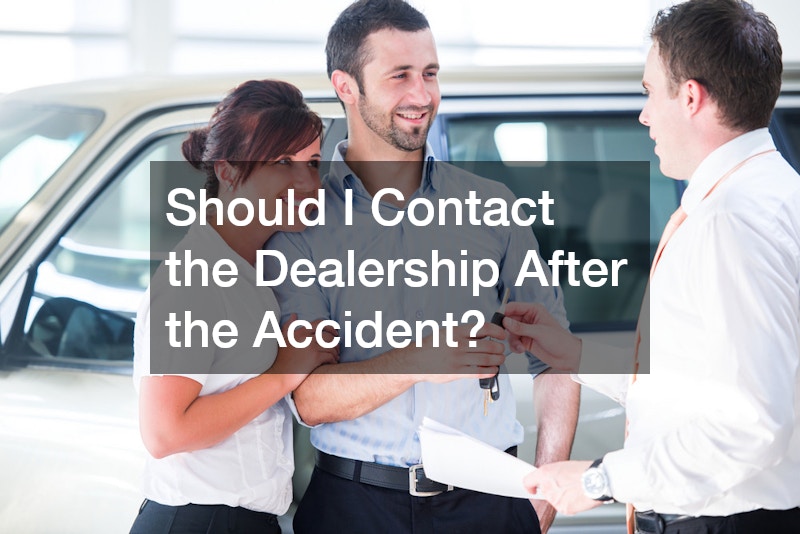
Dealership Warranty Coverage
Depending on the accident and warranty type, some issues may still be covered by the manufacturer or dealership. It’s worth checking if mechanical problems arising from the collision are covered, especially if you purchased extended warranties.
Trade-in Options Post-Accident
Some dealerships offer trade-in programs even for damaged vehicles. If the car is still drivable, the dealership might apply its value toward another vehicle, although the offer will be less than for an undamaged model.
Dealership Advice and Support
Reputable dealerships often have advisors who can guide you through repair or replacement options. They might even recommend certified repair partners or offer in-house repair services. Open communication could ease the burden of managing everything independently.
Exploring Return and Exchange Policies
Certain dealerships have return or exchange policies that allow a car to be returned within a few days of purchase. However, these policies usually require the vehicle to be in its original condition. An accident could nullify the return eligibility, but it’s still worth investigating the policy terms.
Service Department Inspections
After an accident, the dealership’s service department can inspect the car to assess structural and mechanical damage. Having them involved can be beneficial for insurance claims or trade-in assessments, particularly if your dealership is also your authorized service center.
Can I Return My Vehicle After an Accident?
Understanding Return Policies
Most dealerships don’t allow returns once a vehicle has been driven off the lot, especially after an accident. However, if the purchase included a return policy, the damage incurred may affect eligibility. You’ll need to refer to the fine print in your sales agreement.
Lemon Law Protections
Lemon laws are designed to protect consumers who purchase defective vehicles, not those involved in accidents. Unless the vehicle had significant manufacturing defects contributing to the crash, it likely won’t qualify under lemon law statutes.
Eligible Conditions for Return
To return a vehicle post-accident, you’d need to prove the crash was due to a pre-existing condition or defect known to the dealer or manufacturer. This requires substantial evidence, including auto diagnostic reports and legal documentation.
Negotiating Vehicle Return
In rare cases, a dealer may agree to a return or trade if the relationship is longstanding or they see potential for future business. You’ll need to negotiate directly, possibly offering to cover repair costs or accept a reduced refund or trade value.
The Impact of Being At-Fault
If you were found at fault for the accident, your chances of a successful return diminish significantly. Most return policies, even generous ones, exclude vehicles involved in at-fault incidents due to liability and diminished value.
What Role Does Fault Play in Resolving the Situation?
Determining Fault in Accidents
Law enforcement and insurance adjusters determine fault based on evidence, witness statements, and accident reconstruction. The person violating traffic laws or acting negligently is typically assigned responsibility, but comparative fault laws may also apply.
Impact of Fault on Insurance Claims
If you’re found at fault, your insurance may have to pay for the other party’s damages, and your premiums could rise. If you’re not at fault, the other driver’s insurance should cover your damages, although you may still deal with initial deductibles and potential insurance claim dispute issues.
Legal Responsibilities When At-Fault
Drivers at fault may face fines, increased insurance premiums, or legal actions. It’s important to understand your responsibilities, including reporting the incident and cooperating with all parties. Failure to do so can lead to license suspensions or further liability.
The Role of Traffic Tickets
Receiving a traffic citation at the scene is a strong indicator of fault and can be used in insurance determinations and court proceedings. However, you have the right to contest tickets in traffic court if you believe they were issued in error.
Seeking Legal Advice
If the accident involves injuries, significant damage, or potential lawsuits, consult with a personal injury lawyer. Legal counsel can help protect your rights, interpret insurance obligations, and represent you if disputes arise.
How Do I Repair a New Vehicle After an Accident?
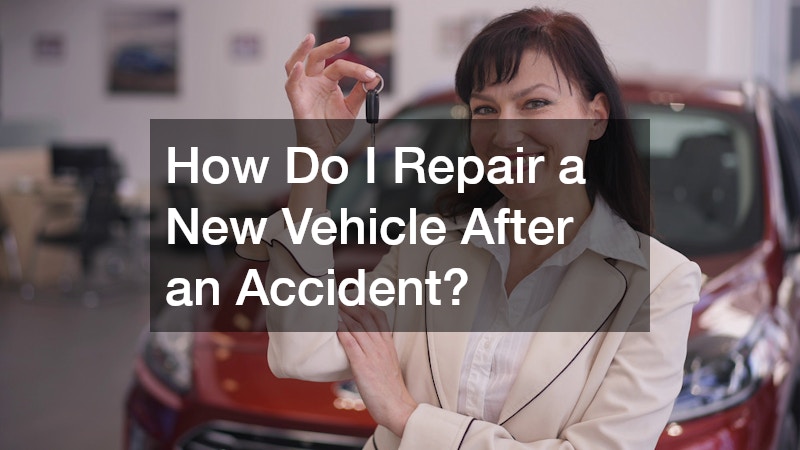
Finding a Certified Repair Shop
Look for a repair facility certified by the vehicle manufacturer or recognized by your insurer. A certified auto body shop will use factory-approved methods and parts, which help maintain your car’s integrity and value. A local BMW repair shop, for instance, would have specific expertise in handling luxury models with precision and care.
Insurance Approval for Repairs
Most insurers require you to get an estimate from an approved shop. Once the estimate is submitted, the insurer will either approve the repairs or send an adjuster to inspect the vehicle.
Use of Original vs. Aftermarket Parts
Request original equipment manufacturer (OEM) parts when possible. Although aftermarket parts are cheaper, they may not offer the same quality or fit. OEM parts preserve vehicle value and integrity better, especially for newer models.
Tracking Repair Timelines
Repair timelines vary based on damage severity and parts availability. Stay in touch with both the shop and your insurer. Many shops provide updates via text or apps to keep you informed of progress.
Quality Assurance on Repairs
Upon completion, inspect your vehicle carefully. If possible, have a third-party mechanic evaluate the repairs. Some damage can be addressed with paintless dent repair, a cost-effective method for fixing minor dents without repainting. If parts require refinishing, powder coating may be used for durable, high-quality finishes. Keep all receipts and reports, as these may be needed for warranty or future resale considerations.
What Financial Implications Should I Expect?
Immediate Out-of-Pocket Costs
Expect to pay your insurance deductible, and possibly costs not covered by your policy. If you lack rental coverage, temporary transportation will also be your responsibility.
Effect on Insurance Premiums
Your premiums may rise if you’re found at fault or even if you’re not, depending on your insurer’s risk assessment. Consider shopping around at renewal time if the increase is significant.
Vehicle Depreciation Post-Accident
Even after repairs, the car may be worth less due to its accident history. This is known as diminished value and can affect resale and trade-in offers.
Long-term Financial Planning
Accidents can impact your credit and financial planning if claims or repairs exceed expectations. Consider setting up an emergency fund or adjusting your insurance to include more comprehensive options. You may also want to assess the impact on other financial obligations, such as private health insurance or medical deductibles if injuries occurred.
Managing Loan or Lease Payments
You’re still responsible for your loan or lease payments, regardless of accident status. Gap insurance can help, but otherwise, be prepared to continue payments while the situation is resolved.
How Do I Handle Emotional and Mental Impact?
Coping with Shock and Anxiety
Being in an accident so soon after purchasing a car can be traumatic. It’s important to acknowledge your emotions and take time to process the event.
Seeking Support Networks
Talk to friends, family, or professionals about your experience. Support groups or therapy sessions can help reduce anxiety and provide coping mechanisms.
Understanding PTSD After Accidents
Some drivers experience post-traumatic stress disorder, especially after severe crashes. Symptoms may include fear of driving, flashbacks, or sleep disturbances. Don’t hesitate to seek medical attention if these symptoms occur. If the accident happened while on the job, consulting a workers comp attorney could be vital in managing both financial and emotional consequences.
Rebuilding Confidence in Driving
Start with short, familiar trips to rebuild your confidence. Gradually increase your driving as you feel more comfortable. Defensive driving courses can also help restore trust in your abilities.
Balancing Stress and Responsibility
Managing insurance, legal, and repair obligations while dealing with emotional fallout can be overwhelming. Prioritize self-care and delegate tasks when possible to avoid burnout.
How Will This Affect the Value of My Car?
Depreciation Due to Damages
A car loses value immediately after purchase, and an accident accelerates depreciation. Even with full repairs, the car is no longer considered “accident-free.”
Understanding Diminished Value Claims
Some insurance companies allow for diminished value claims, compensating you for the loss in market value due to the accident. These claims require documentation and often an independent appraisal.
Impact on Resale Value
Potential buyers may avoid vehicles with accident histories, especially newer models. Be prepared for reduced offers or longer selling times.
Obtaining an Accurate Appraisal
Have your vehicle appraised by professionals familiar with post-accident evaluations. This appraisal can support insurance claims or resale negotiations.
Market Influences on Car Value
Used car market conditions, vehicle rarity, and brand reputation all play a role in post-accident value. Research local trends to set realistic expectations.
Are There Legal Considerations I Should Be Aware Of?
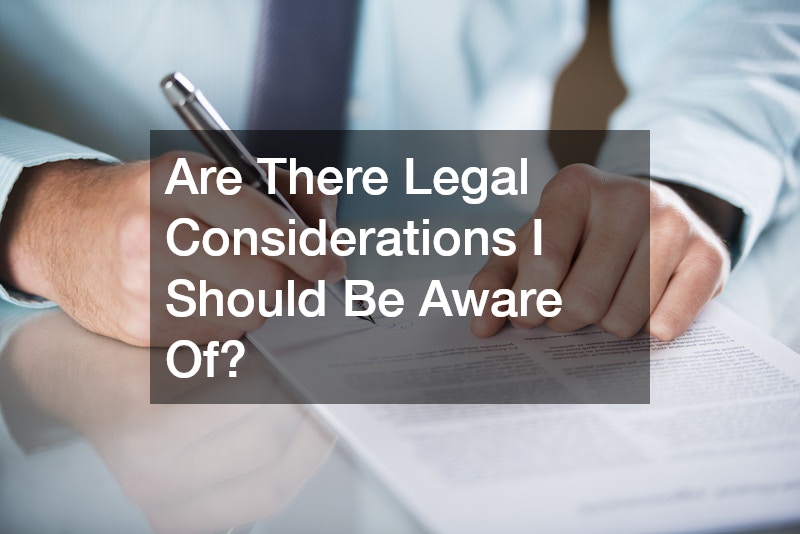
Information to Share Legally
Only share necessary and factual information at the scene. Avoid admitting fault or speculating on causes. Let insurers and law enforcement handle investigations.
Liability Laws in Different States
Liability rules vary. Some states follow “no-fault” laws, where each party’s insurance covers their expenses regardless of fault. Others use comparative or contributory negligence systems.
Engaging a Personal Injury Lawyer
If injuries are involved or the situation is legally complex, hiring a personal injury lawyer ensures your rights are protected. They can negotiate with insurers or represent you in court.
Filing a Lawsuit for Compensation
You may be entitled to compensation for damages, medical expenses, or emotional distress. Timely legal action is essential to ensure eligibility.
Adhering to Legal Timelines
Every state has statutes of limitations on accident-related claims. Missing these deadlines can prevent you from pursuing compensation or legal recourse.
Closing Thoughts
A car accident right after purchasing a vehicle can turn excitement into frustration and confusion. However, knowing the appropriate steps to take—from ensuring safety and contacting your auto insurance company to understanding your legal and financial rights—can help you navigate the situation with composure. Being proactive, seeking professional guidance such as from a personal injury lawyer or workers comp attorney, and leaning on support systems will ease the burden and help you regain control of your investment and well-being.
